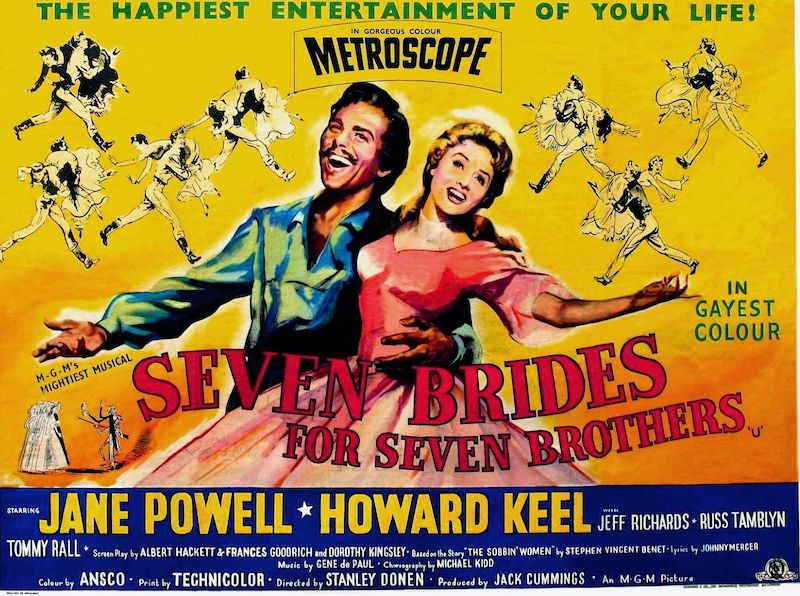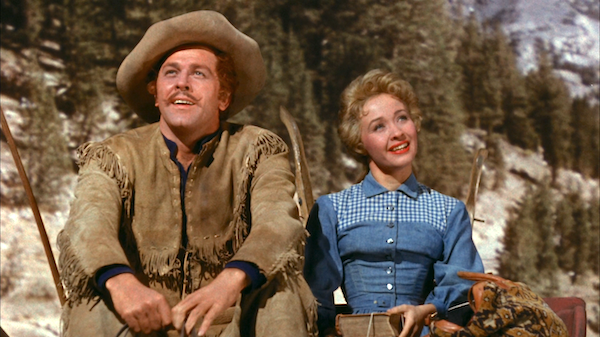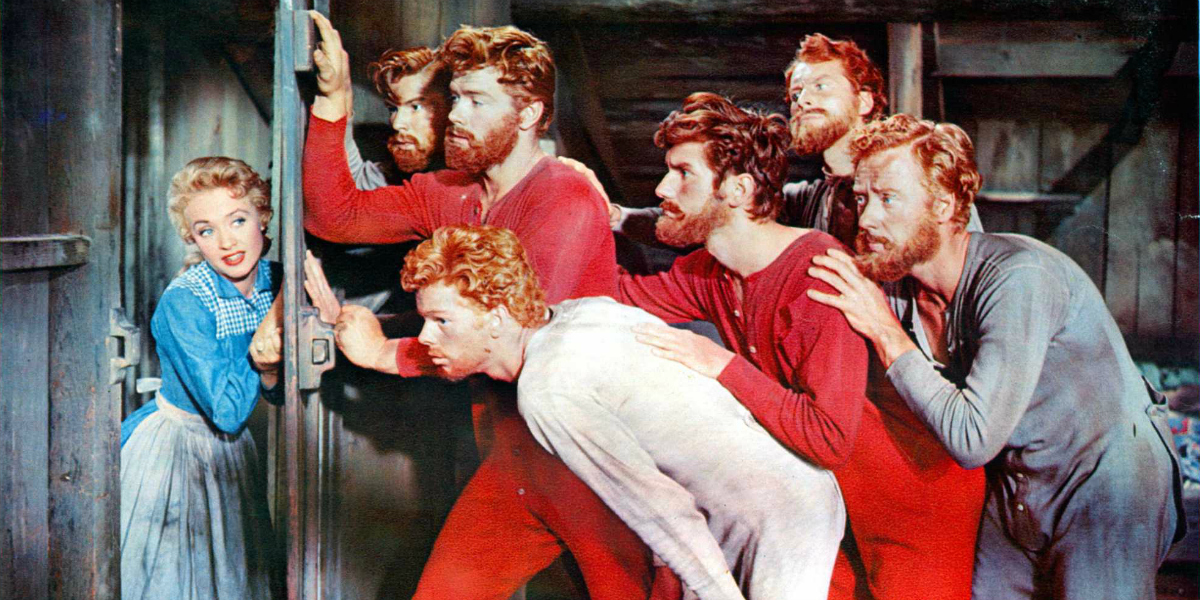We're celebrating music man Howard Keel's centennial this week. Here's Lynn Lee...

In many ways, Seven Brides for Seven Brothers (1954) marked the peak of Keel’s MGM career, coming after his breakout role in Annie, Get Your Gun and his star turns in Showboat and the less-successful but still-classic Kiss Me, Kate! Keel’s film career would fade in the years that followed, although he continued to enjoy success on the stage and in later life would find TV fame with his role on “Dallas.” It was Seven Brides, though, that captured Keel in his screen prime as an appealing and charismatic musical actor who managed to make a problematic character (to say the least) surprisingly compelling.
Full disclosure: Seven Brides was one of my favorite movies growing up, and remains one of my all-time favorite musicals. As a young child I loved it even more than West Side Story and The Sound of Music because it felt like a happier movie than the other two...

It wore its romantic aspects more lightly, made me laugh more often, and never reduced me to a puddle of tears or fears. Even as I got older and realized that there were some pretty squicky gender dynamics underlying the rollicking fun, I retained – and still retain – deep affection for the film.
Sure, it’s about a bunch of men inspired by a story of ancient Roman rape to kidnap a bunch of unsuspecting women to be their wives, only to win over said women and presumably live happily ever after. Still, Seven Brides ends up being way more enjoyable for modern audiences than you'd expect from that premise, thanks in large part to the irresistibly catchy songs (the film would win the Oscar for best score, in addition to being nominated for picture, adapted screenplay, cinematography, and editing) and absolutely spectacular dance numbers (that barn-raising sequence is for the ages, as is the hilariously doleful woodchopping ballet, “Lonesome Polecat”). There's also a disarming wink-and-nod quality to the acting that invites us not to take the abduction plot too seriously - the clear implication is the abductors are clueless backwoodsmen who simply don’t know any better. (The script was apparently based on a short story by Stephen Vincent Benet that I have not read but suspect was probably even more satirical.)
Which may be why I still have “Sobbin’ Women” stubbornly stuck in my head despite the wince-inducing lyrics (satire or no, they are baaaad):
There is a moral message here, though, as Seven Brides turns on the redemption of Keel’s character, Adam Pontipee, who takes pretty much the entire movie to learn the error of his ways. As the oldest of seven sons, he’s the natural leader of a pack of much more pliable and credulous men (including a babyfaced Russ Tamblyn as the youngest brother, Gideon) who assume Adam always knows best – including the best way to get a wife. By that token, Adam’s also the one who takes the longest to recognize that he’s a willfully stupid, entitled pig who’s set a terrible example for his brothers.
He’s ultimately saved by his wife, Milly (a fabulous Jane Powell), whose only flaw is that she fell in love with him, but who also calls him on his shit, protects the abducted girls, and earns an even deeper level of respect from the brothers than Adam does. (I could write a whole separate post on how Powell’s Milly is the linchpin of the movie.) As it is, Adam’s mea culpa moment feels a bit too little, too late, and still too patriarchal by today’s standards, as he basically admits that it took having a daughter of his own for him to understand why what he did was so awful.

Yet it’s a testament to Keel’s screen presence that you buy Milly’s love for him, despite everything, and that you still root for them as a couple and for him to be a better man. It also helps, of course, that he’s tall and strappingly handsome and has a sexy bass-baritone singing voice that could make anyone a little weak in the knees. As one of the few Pontipee men who doesn’t dance (most of the brothers were played by professional dancers), he still cuts a commanding figure, especially next to tiny Milly.
Perhaps the best distillation of Keel’s character comes at the beginning of the movie, in his paean to the wife he hasn’t yet met but is cheerfully confident he’ll have for the asking:
In just that one sequence, Keel captures everything that’s both most attractive and most repulsive about Adam Pontipee. We may roll our eyes, but like Milly, we can’t take them off him.
Previously
Annie Get Your Gun (1950)
Calamity Jane (1953)